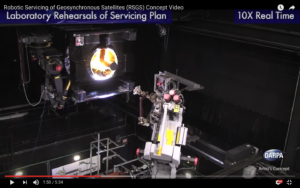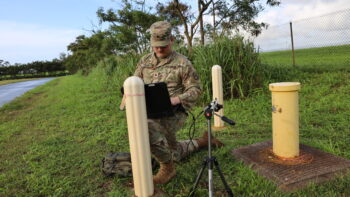
Commerce Secretary Wilbur Ross
WASHINGTON: House appropriators have rejected the Trump Administration’s plan to consolidate authority to regulate commercial satellites in a new bureau within the Commerce Department. Under the White House plans, the enhanced Office of Space Commerce would also take over from the Air Force the job of providing space situational awareness (SSA) data and analyses to commercial and foreign space operators.
The Democrat-led House Appropriations Committee (HAC) approved a fiscal year 2020 spending bill for Commerce that bars all funding for administration’s proposal, which would move the Office of Space Commerce out from under the National Oceanic and Atmospheric Administration (NOAA) and make it its own free-standing Bureau of Space Commerce. The Trump Administration asked for $10 million in 2020 to fund the reorganization.
The White House, in its May Space Policy Directive-2 (SPD-2), ordered the reorganization of the office that laid the groundwork for establishing Commerce as the lead oversight organization for US commercial space activities, including dual-use operations such as satellite servicing. A big part of the administration mandate focused on streamlining regulations to help US firms on the international marketplace.
The Office of Space Commerce (led by Kevin O’Connell) issued its proposal for new rules on remote sensing satellites late last month, proposing to reduce DoD’s role in reviewing activities deemed low risk to US national security. Indeed, Commerce Secretary Wilbur Ross at Space Symposium 2019 in Colorado Springs said that his goal “is to ensure that the United States captures the lion’s share of burgeoning space markets.”
Space Policy Directive-3, issued a month later, followed up by designating the office as the civil agency to shoulder the commercial SSA mission, and future space traffic management oversight.
Democrats, however, have been leery of the choice of Commerce for SSA/STM oversight. Instead, they favor the Obama Administration’s original plan to shift those responsibilities to the Federal Aviation Administration (FAA), which sits under the Department of Transportation. As a result, the future US regime for SSA/STM has been caught up in a turf war that is frustrating satellite operators seeking regulatory clarity as they plan future operations.
In fact, the House defeated the Space Frontier Act legislation proposed last year by the Senate that would have enabled the administration’s plans for Commerce — despite the fact that both chambers of Congress were in Republican hands at the time. The Senate bill’s sponsor, Sen. Ted Cruz, reintroduced it (with a few tweaks designed to mollify its chief critic, Democratic Rep. Peter Fazio) in March.
The HAC report states in no uncertain terms: “The Committee rejects the proposal to transfer the functions of the Office of Space Commerce and Commercial Remote Sensing Regulatory Affairs and instead maintains their funding within NOAA[‘s National Environmental Satellite, Data and Information Service.] ” But neither the report nor the text of the bill offers an explanation as to the reason for the move.
However, the HAC is peeved off at Ross for his refusal to testify on the Commerce budget request earlier this year. The report language chides: “Any action that hinders the Committee’s ability to carry out its oversight authorities, such as the Secretary’s unwillingness to testify before the Committee on its annual budget request, is unacceptable.”
If it’s of any solace to the White House, the HAC bill does approve the administration’s request for $1.87 million to fund the interagency National Space Council, chaired by Vice President Mike Pence.
From Boeing’s struggles to inflation relief funds: 5 industry stories from 2024
Making a year-end list in which she forces references to Taylor Swift songs for no reason has basically become reporter Valerie Insinna’s favorite Christmas tradition.




























